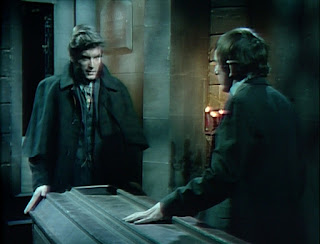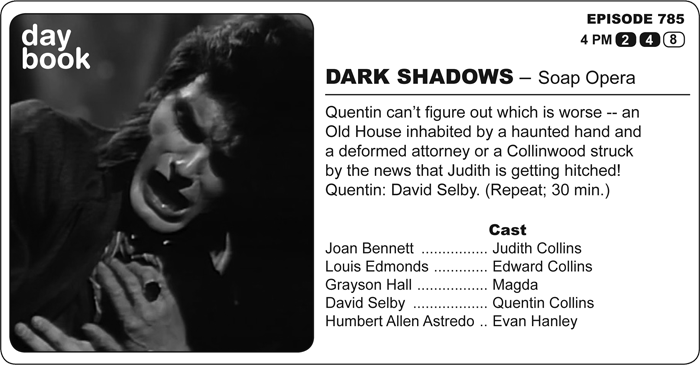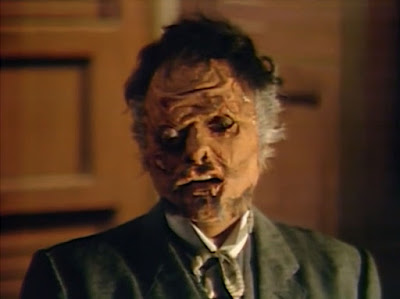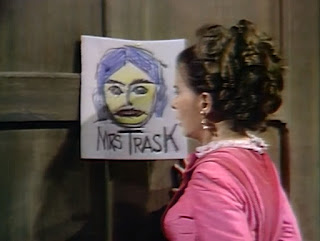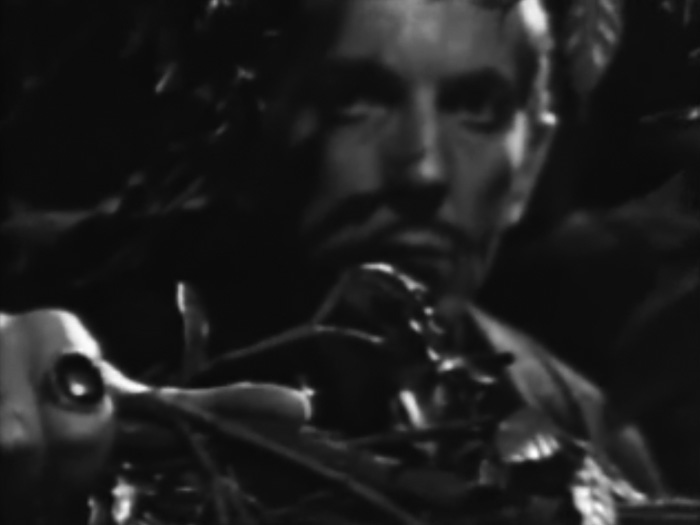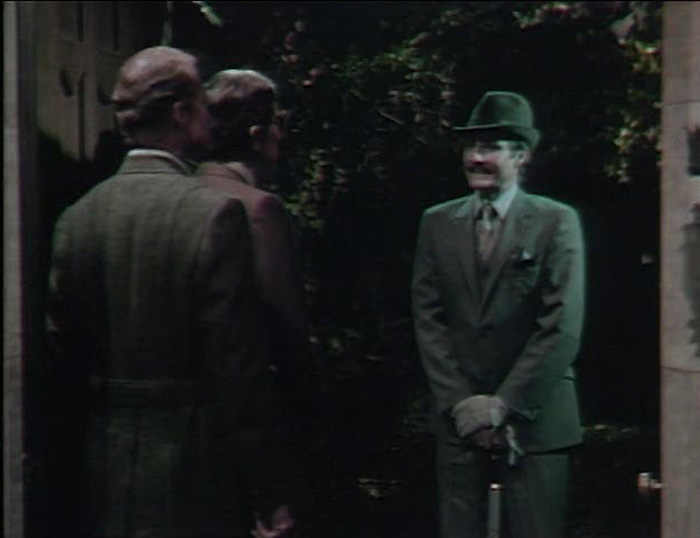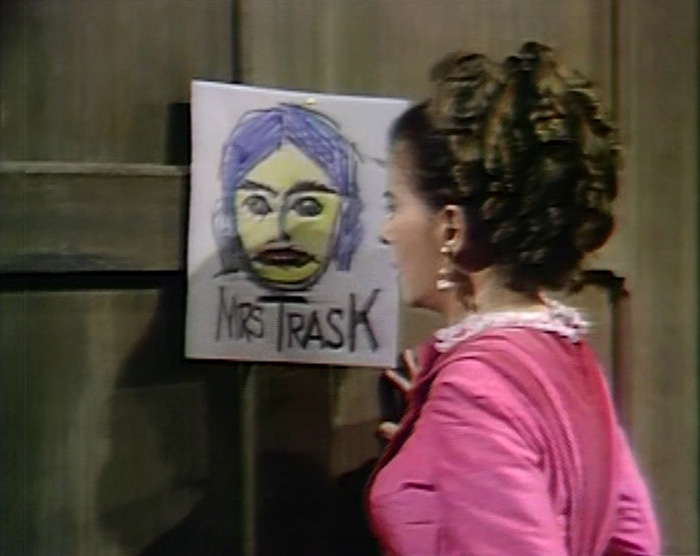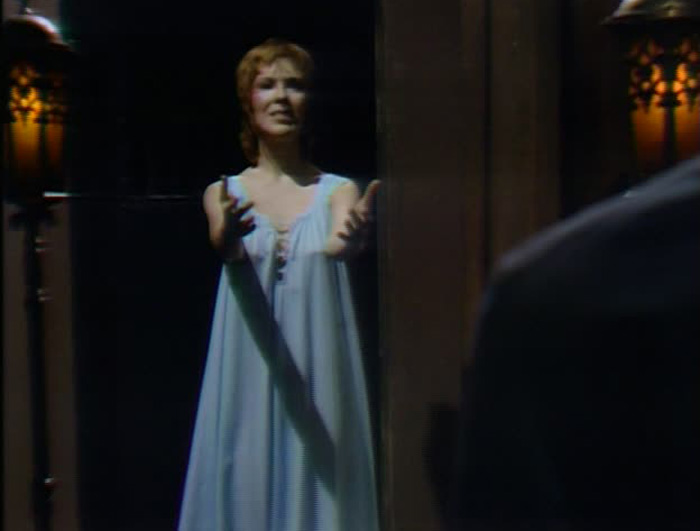By PATRICK McCRAY
June 20, 1966
Taped on this date: Episode 6
Searching for David in the cellar of Collinwood, Vicki runs afoul of Matthew Morgan, Collinwood’s rough, violent groundskeeper and a man stringently protective of those who might harm Liz. He attacks her, having no idea who she is until Liz enters and intervenes. Vicki was trying to look in the locked room, and that is very concerning. No one is to be in the cellar… especially that room. Liz tells Vicki to wait upstairs for the conversation to continue. Liz hears a sound when alone, and she finds David in a crate, listening. David is afraid that Vicki hates her and that Liz will punish him as his father would: physically. Liz assures him he’s safe at Collinwood. Upstairs in the drawing room, Morgan and Vicki tersely introduce themselves. Vicki tries a warmer approach, and Matthew remains standoffish. When asked about Paul Stoddard and Liz’s past, we learn that Matthew had been a janitor eighteen years prior, but after Paul left, Liz fired the entire domestic staff and brought him on as the sole worker, giving him his own cottage on the estate, for which he’s very grateful. He ends by telling Vicki to mind her own business. In the basement, Liz goes through Roger’s childhood things, finding books and such that David might like. She asks why David is afraid of Miss Winters, and David answers that as long as Vicki is there, his mother will never come back. Liz says that Vicki was raised in an orphanage and knows what it’s like to be separated from parents. Carolyn and Vicki meet in the drawing room, and Carolyn advises her to ask Liz about the connection between the money rolling in from Maine and the changes at Collinwood 18 years prior. Liz enters and excuses Carolyn. Liz explains that she must convince David that he’s wrong to fear her. He was attached to his mother, and sees Vicki as a threat. Vicki concedes, and asks Liz about the timing between the money from Maine and Paul’s exit. Liz says there is no connection. She presses her about why she hired her. Liz gives an unconvincing recommendation about someone at the home recommending her to Roger. Liz then exits. Carolyn enters, but Vicki wants to go to town alone. Carolyn lends her her car.
Victoria Winters is far bolder than I remember, and I wonder if this is the hand of Art Wallace. Dare I say, headstrong? I dared and I said. Today is notable for the fine contribution of
George Mitchell as Matthew Morgan, one of the series’ first villains. After three episodes,
Thayer David took over for him. Morgan is a jagged claw in a world of soft hands in white gloves, and with his Down East accent and antiquated syntax, he is a forbiddingly immovable object. Mitchell, a veteran of movies like 3:10 TO YUMA, brings a sense of immediate danger and shark-like relentlessness to the show. He can also be seen in several Irwin Allen classics (TIME TUNNEL and LAND OF THE GIANTS) as well as THE TWILIGHT ZONE. Later, chase him down in THE ANDROMEDA STRAIN.
June 20, 1967
Taped on this date: Episode 267
Liz stands on Widow’s Hill, precariously close to jumping. Barnabas observes her, ready to catch her -- and he does. She says that she was seeking serenity. That’s why he goes there, too. It’s a place where death began, and death is the most fascinating condition of life. What is beyond? Eternal existence or nonexistence? Is it even defined? Does it bring eternal peace or torment, and is it more of either than life presents. Liz suggests that she is tormented, and Barnabas wants to ease it. Barnabas offers to help her, but she says that he has given her the solution, and soon, everyone will know. He walks her to Collinwood, and she thanks Barnabas for clearing her thoughts. She goes upstairs, not hearing David call to her. David greets Barnabas, who asks him about the little girl he’s been seeing at the Old House. David says she’s old-fashioned and even sings ‘London Bridge.’ This strikes Barnabas as having some significance, but he tells David to ask her to go away. Turning his attention to Vicki in the drawing room, Barnabas becomes extremely flattering. He then reveals his concerns that Liz is suicidal. Vicki denies it, and Barnabas asks her to observe her, adding that he’d like to see more of her. She agrees, and goes off to dinner with Burke. Barnabas notes this. At the Blue Whale, Burke waits impatiently. Vicki enters and apologizes for being late. They dance, and affirm that they need the relationship. She had to get out of Collinwood, and sometimes can’t face going back. He holds her reassuringly. Burke says he’ll create a job for her to get out. She can’t now; she’s needed. The Collins family is her only one, and Burke? He’s in a class by himself. She pulls back and Burke knows it. She reports on Liz’s strange behavior. Burke’s having Jason checked out, but Vicki indicates it’s pointless. Burke says he must know if Liz intends to harm herself. Vicki says she’s needed at Collinwood and rushes back to see Liz heading off to bed. She finds David going through the family Bible, listing years of births and deaths, and she was looking at her own page.
No one does an irrational preoccupation with death like Joan Bennett, and this is prime. Again, I wonder if this is where the writers decided to keep Barnabas around. There is a beautiful irony in Barnabas again stating that he normally doesn’t like to meddle in family business. Barnabas is the stealth mode head of the family, solving problems like a frightened version of
Harvey Keitel in PULP FICTION. Jason doesn’t frighten him; just Liz’s preoccupation with the hereafter. Another clue is that Barnabas begins to flirt very heavily with Vicki, repairing the accidental reshaping they did to the initial conception of the show by shifting the focus from Vicki to Maggie. That’s a storyline that you don’t just start and then drop. As for Burke Devlin? For those who are curious, George will remain in the role, also taking on Jeremiah. The change in actors couldn’t be better-timed. This is a softer Burke Devlin… a man in love. In this case, it literally transforms him. While it would have been fascinating to see
Mitch Ryan in the part, George has the air of a man whose troubles are genuinely over, so when he demands to help Liz, we know he means it.
June 20, 1968
Taped on this date: Episode 521
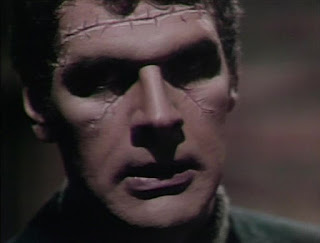
Roger first saw signs of Liz thinking herself Naomi Collins several days ago and is distraught at the idea of Liz dead. Roger worries of her up in the tower room, where legends say others have been hidden. Barnabas tries to reassure him to maintain his optimism. Roger pines for Cassandra’s insight. Julia appears and says that Liz will be all right. She’s taken poison… an old herbal poison, common in the 18th century. Roger resists Julia’s diagnosis that she is mentally ill. She needs to go to Windcliff until her suicidal urges have passed. Roger is incensed and will see her, himself. He’s advised to let her rest. After he leaves, it’s confirmed that she’s taking Naomi’s poison. But if Cassandra is gone, how? Was Trask responsible? Is he at peace? Perhaps not. His skeleton has yet to vanish. They call Stokes’ home, but Adam picks up the phone and remains silent, not understanding a phone but recognizing the sound of Barnabas. The silence worries Barnabas and Julia. Adam returns to his studies and greets Stokes formally when he enters. Stokes is teaching Adam to read with flashcards, and he is successful until the word ‘telephone’ appears, distracting him. At Collinwood, a worried Barnabas and Julia decide to drive to Stokes’ home. Meanwhile, Adam recites the alphabet perfectly. The doorbell rings, and Barnabas announces himself. Stokes asks Adam to hide in the bedroom, but Adam seethes. Julia and Barnabas enter and report the oddness with the phone, which is still off the hook. Stokes blames the cleaning woman and asks them to stay for sherry. They say that Cassandra is gone and that Trask’s skeleton has reappeared, but then they report on Liz’s oddness. But why is this going on if Cassandra is defeated? Stokes asks for the portrait of Angelique. It will reveal what happened to Cassandra Collins. At Collinwood, Barnabas instructs Julia to distract Roger while he searches for the portrait. Barnabas returns, empty handed. Roger reveals the portrait in the drawing room, horribly faded. A knock at the door… it’s Nicholas Blair: Cassandra’s brother.
Two years in, and Roger has gone from someone who proudly announces how much he resents Liz and David to a having a deep devotion for each.
Louis Edmonds and the writers transform the character before our very eyes, and we’re not even aware there’s a trick going on.
Robert Rodan steals part of the show, too, as an Adam very believably going from beast to man. Finally, we get the first moment of
Humbert Allen Astredo. When I first watched the show, that was one of the unforeseen plot points that hooked me. Astredo was a deeply serious actor, but he had also been a stand-up comedian, entertaining his fellow soldiers in the Korean War. Combine those two things and you get the devious genius behind Nicholas Blair.
June 20, 1969
Taped on this date: Episode 785
1897. Evan sits in the Old House, dazed and disfigured by the Hand. There is a knock at the door and she hides Evan in the cellar. It’s Quentin, looking for Barnabas to remind him there’s a full moon. Quentin hears Evan knocking around in the cellar, and sees the malformed attorney through the bars. Releasing Evan, Quentin asks the man who he is, and Evan wanders to the chair. Who is he? Magda finally admits that his mind has been destroyed and has nothing to do with Quentin. He becomes violent, and Magda becomes equally defiant, leaving to fetch the Hand. Evan resists the presence of the Hand, and Magda takes him away. How will the Hand cure him? By Magda placing it on his heart. It has powers beyond her reckoning. Quentin is torn over using it. At Collinwood, Edward enters as Judith telephones town, looking for Evan. Quentin comes in, as well, bragging of painting the town red. Judith announces that she has married Trask. Edward fumes, and Quentin laughs, congratulating her. Judith ends up slapping Edward for his reprimands. She has drawn up a paper to transfer the Collins money to Trask if she dies before Jamison turns 21. Edward storms out, followed by an amused Quentin. Alone, she finds her changed will on the floor. She hears a noise and looks away from the desk. When she looks back, the Bible is open to a passage about evil coming for the righteous. Who is doing this? She turns again to find a child’s drawing of Minerva Trask. In the study, Edward fusses over the matter at a nervous Quentin. Edward wants to go to Evan that night, and Quentin tells him not to count on him before angrily leaving. Magda arrives at Collinwood to beg Quentin to use the Hand. He agrees to be at the Old House at dusk. Later, he arrives at the Old House as he promised and finds Evan still in the sitting room. Evan speaks his own name, and then “the Hand,” as Magda takes him away. Quentin is terrified of the Hand, but then begins to transform. She casts an invocation over the Hand and places it on Quentin.
There are so many unsavory jokes about the Hand that I probably shouldn’t say anything. Rather, I’ll let Quentin do the talking… from my sequel to the Collins Chronicles:
My lawyer’s face had melted, I was about to transform into a wolf, and my only salvation was a severed hand.
There was a time when, even though steeped in the black arts, I would have found this shocking. Now, it was white noise.
It took me having a moment alone with the Hand to be disturbed by it. Shouldn’t I have been disturbed immediately? I recall sharing the room with Evan and the Hand for over a minute before it struck me that all of this was more than a little abnormal.
I went back to Collinwood where Judith announced she’d married Trask. Of course. The only thing more bizarre would have been seeing Carl actually able to grow whiskers.
I laughed.
Edward fumed.
Judith slapped him.
Happy days were there again! For others, anyway. In the House of Collins, happiness does not exist. Things only grew more bizarre from there. Edward was forming a war party to find Evan. Judith was reading a Bible (which was my old trick used to shock father). All was out of joint.
I would have stayed, but I was about to see if Count Petofi’s Hand could cure my lycanthropy… with only moments to go before my ravenous side took hold.
It was excruciating then. Almost farcical, now. The time was right. “Oh, Count Petofi? We need all of you at this point. Not just the hand.”
Oh, it was also a slow news day. It’s nice to see the Hand getting more and more action. Um, as in ‘into the action.’
June 20, 1970
Taped on this date: Episode 1050
1970PT. Liz speaks of Carolyn’s mournful reaction to Will’s death. She’s beside herself with worry. Roger enters, nervous, taking Julia into the hall, and reports that Carolyn has been murdered. She’s in the tower. Liz, having overheard this, rushes to the tower, saying that Carolyn knew who the murderer was. Later, Roger comforts Elizabeth. He states that they must find Quentin. Carolyn had seen Quentin the day before. Roger begins to say that Carolyn told her a secret, but then changes the subject. Liz, wanting to be alone, leaves. Hoffman returns to the secret that Carolyn imparted to him. He begins speaking of the strangeness of Alexis’ visit. Liz returns and asks Roger to go to the mausoleum and select a site for her burial. Before they get there, a figure accesses the secret room and enters. He starts when Liz and Roger are near, and he brandishes a knife. Liz doesn’t want her buried next to Angelique. They exit, followed by the mysterious stranger. Later, Julia stands over the body, trying to understand how to bring it half-alive to control Angelique but not kill her. Liz takes Roger to Loomis House, where she seeks Carolyn’s papers stating who murdered Angelique. Is it Quentin or someone else? Perhaps the missing Trask. She finds the paper, but it is unfinished. It says that if anything happens to her, it is because “he knows I have the proof.” They leave, with Roger pocketing the paper. Meanwhile, Julia uses the equipment once used to bring life to Adam and Eve. She begins the process, starting elaborate equipment. The body glows with light. Machines crackle. She is unsuccessful without Stokes’ black magic. She must find the missing occult component. As she leaves Loomis House, the stranger enters it, ascending the stairs. Julia enters Collinwood, saying that the police found the murderer’s knife and then gloves he used… Quentin’s gloves. Proof? Liz thinks so. Roger and Liz vow that he must be caught. Alone in the makeshift lab, the body rises from the table and climbs the stairs. Meanwhile, the stranger searches Loomis House, knife in hand. The body enters from the basement, arms outstretched for the stranger.
Full-blown Agatha Christie! That’s what it feels like, anyway. The show is just on the edge of action, which is the state of action on DARK SHADOWS, and you can feel the Parallel Time payoffs coming. Roxanne Drew walks. Roger knows the jig is almost up. And Angelique is about to have a Very Bad Eternity. Who doesn’t love a mysterious stranger stalking graveyards and haunted mansions, brandishing a deadly blade? With his long coat, he pretty much is actually in cloak and dagger! This episode also has only four players. It’s a claustrophobic chamber piece where fate is closing in rather than the walls.
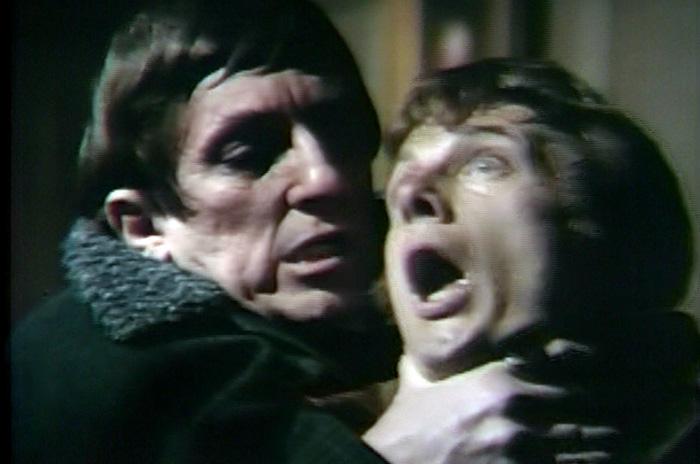
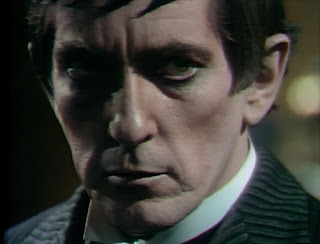 Quentin does his part as well, and this episode is a microcosmic portrait of both his overall journey and what makes him the series’ second protagonist -- yet he never loses his essential gift for guile. He goes from melancholic repose with his companion music to smugly condescending to Trask’s self-serving sense of justice. From there, he sets aside fear to see Barnabas for the man within the monster, and even collaborates to cover Carl’s death with a fittingly unsentimental show of theatrical relish, not just enacting the con, but reveling in it.
Quentin does his part as well, and this episode is a microcosmic portrait of both his overall journey and what makes him the series’ second protagonist -- yet he never loses his essential gift for guile. He goes from melancholic repose with his companion music to smugly condescending to Trask’s self-serving sense of justice. From there, he sets aside fear to see Barnabas for the man within the monster, and even collaborates to cover Carl’s death with a fittingly unsentimental show of theatrical relish, not just enacting the con, but reveling in it.
